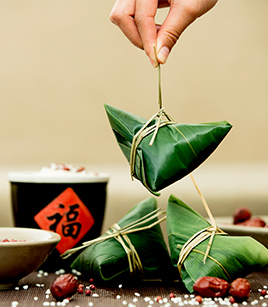Origins and customs of Duanwu Festival

Zongzi, the most distinctive food of the Duanwu Festival Photo: CFP
The Duanwu Festival, also known as the Dragon Boat Festival, falls on the fifth day of the fifth month in the Chinese lunar calendar. This day has historically been tied to ancient beliefs and superstitions.
As early as the pre-Qin period more than 2,000 years ago, the fifth month was considered inauspicious, because seasonal change caused increasing heat and humidity, which facilitated the spread of diseases. Therefore, celebrations were centered around practices to ward off sickness. Customs were established, such as drinking realgar wine (a rice wine mixed with the mineral realgar, as ancient Chinese believed that this drink was an antidote to poisons) and wearing sachets stuffed with herbal medicines.
As history and culture developed, many stories were attached to the origins of Duanwu Festival. By far, the most popular story was of Qu Yuan (c. 340–278 BCE), a great patriotic poet from the Warring States Period (475–221 BCE). It is said that Qu committed suicide by drowning in the Miluo River on the fifth day of the fifth lunar month. Another historical figure attached to this festival was Wu Zixu (559–484 BCE), a patriotic court official from the Wu state (centered on today’s Jiangsu Province), whom the king mistakenly ordered killed and thrown into a river on the fifth day of the fifth lunar month.
As one of the most prominent activities of the festival, dragon boat racing is thought to represent the search of Qu’s body. Another theory of the origin of this event is related to China’s dragon worship. The race has long been a means of strengthening bonds within families and communities. Today, dragon boat racing is a popular sport across the country.
The most distinctive food for the festival is zongzi, a traditional dessert made of glutinous rice and fillings wrapped in leaves of bamboo or reed. Some say that the purpose of dropping zongzi into river is to feed Qu’s spirit, while the others hold that zongzi can keep fish from eating Qu’s body. Zongzi varies in taste from the north to the south. Northern style zongzi are usually sweet, filled with red dates or candied dates. In the south, zongzi have several savory flavors which depend on the fillings.
Edited by REN GUANHONG
